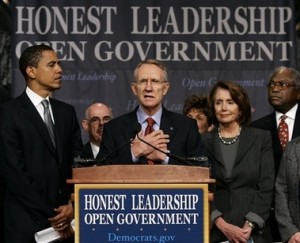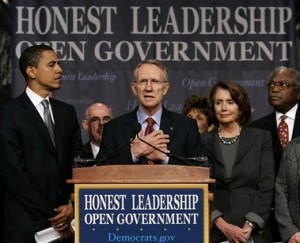
On ABC's This Week today, Democratic House Speaker Nancy Pelosi Again Attacks the Tea Party Movement as "Astroturf, as Opposed to Grassroots"
Democratic House Speaker Nancy Pelosi appears to be reading from the summer of 2009’s talking points, smearing the tea party movement as “directed” by the GOP and “astroturf, as opposed to grassroots” this morning on ABC in remarks taped earlier this week, echoing her remarks from the summer of 2009:
And Pelosi still believes Washington Republicans are trying to quietly influence the tea party movement through well-funded, fake grassroots organizations, referred to as “astroturf.”
“The Republican Party directs a lot of what the tea party does, but not everybody in the tea party takes direction from the Republican Party,” Pelosi said. “So there was a lot of, shall we say, Astroturf, as opposed to grassroots.”
And she said she’s not worried about the threat the movement present to her party.
“We’re fully prepared to face the American people with the integrity of what we have put forth, the commitment to jobs and health care and education and a world at peace and safe for our children and with the political armed power to go with it to win those elections,” she said.
Speaker Pelosi appears to be behind the times, even in liberal circles, as while her summer 2009 “astroturf” comments were backed by the mainstream media, in 2010 the media has shifted gears and reports on the tea party movement as an authentic grassroots movement, as in this AP article covering Sarah Palin’s speech at the tea party convention a few weeks back:
Her audience waved flags and erupted in cheers during multiple standing ovations as the 2008 GOP vice presidential nominee gave the keynote address Saturday at the first national convention of the “tea party” coalition. It’s an antiestablishment, grass-roots network motivated by anger over the growth of government, budget-busting spending and Obama’s policies.
Palin’s 45-minute talk was filled with her trademark folksy jokes and amounted to a pep talk for the coalition and promotion of its principles.
An AP story this morning also outlines the Pelosi claim on ABC’s This Week that the tea party movement is not an authentic grassroots movement:
WASHINGTON — House Speaker Nancy Pelosi is questioning whether the conservative “tea party” coalition truly represents a grass-roots movement.
In a broadcast interview, Pelosi calls tea party voters the “astroturf” movement. She says many of those voters have good intentions but that the Republican Party has hijacked the movement for its gain.
Speaker Pelosi is also forgetting the impact the tea party movement had in pushing the GOP to victories in Virginia, New Jersey and most recently Massachusetts, all of which occurred after her original “astroturf” comments in the summer of 2009. If the tea party movement actually was just an artificial, shallow creation of the GOP, and not a true, broad-based, grassroots movement, the surge in voting for GOP candidates since the tea party emerged probably would not have occurred. As tea party activists from all around America contributed to Scott Brown’s Massachusetts Senate election campaign, and when some even made the trek to Massachusetts to work in phone banks, knock on doors and plant signs all around Massachusetts, it is unreasonable to claim such a movement is artificial and fake as the facts simply do not support the claim.
Amazingly, despite smearing them as astroturf, Pelosi also claimed that the Democrats are on the side of the tea party movement at one point in the interview as well:
House Speaker Nancy Pelosi believes the tea party movement shares a common enemy with Democrats — the entrenched special interests that feed money into the political system.
“We share some of the views of the tea partiers in terms of the role of special interest in Washington, D.C.,” Pelosi said in a taped interview airing Sunday on ABC’s “This Week.” “It just has to stop. And that’s why I’ve fought the special interest, whether it’s on energy, whether it’s on health insurance, whether it’s on pharmaceuticals and the rest.”
Perhaps Pelosi is not keeping up with the news, because Democratic President Barack Obama, not the GOP, made the backroom deal with Big Pharma, and others, and such backroom deals is a source of disgust to most tea party activists. Further, Obama also lined up almost all of the Fortune 500 behind his cap and trade plans, hardly evidence of Democrats fighting special interest influence. Pelosi also omits any reference to the Democratic kowtowing to unions, who after all are also special interest groups using big money in politics, and Obama most recently evidenced his undying allegiance to unions by placing a pure union political operative, SEIU boss Andy Stern, on his “bipartisan” deficit commission.
Finally, any claim that the Democrats and Obama are trying to combat special interest and big money influence was made inoperative by Obama’s appointment of Julianna Smoot as his White House Social Secretary in the wake of Desiree Rogers’ resignation in disgrace over the party crashers debacle. Julianna Smoot was the President’s chief fundraiser for Obama 2008, and as such was the main point of contact for Obama’s bundlers and big money donors. Now, as Social Secretary, Smoot is in charge of controlling access to the White House, which can only be seen as “good news for wealthy donors to President Obama’s campaign, for whom Smoot — the chief campaign fundraiser — is friend and point of contact.” Smoot also has close ties to convicted bigwig Democratic fundraiser Norman Hsu as Hsu was “one of the most reliable donors from her tenure as finance chair for the Democratic Senatorial Campaign Committee.”
All told, Pelosi’s appearance today on This Week, with the renewal of the “astroturf” smear of the tea party movement, is unlikely to bolster Democratic fortunes in the short term or in the November 2010 election. While Pelosi puts on a brave face and declares the Democrats will retain their majority in the November 2010 elections, the continued smears of America’s most vibrant political movement as of today will probably move the needle in the opposite direction.


